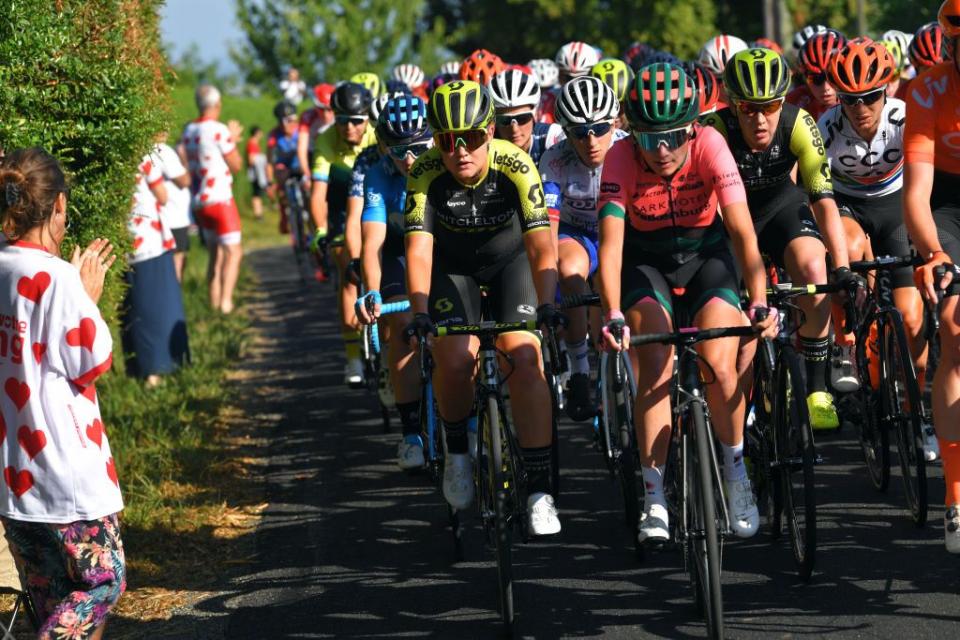Finally, the Tour de France Gets Rid of the Podium Girls

Organizers of the Tour de France recently announced that this year, there will be no “podium girls” presenting the awards to—and kissing the cheeks of—the winners. Instead, there will be one male host and one female hostess to help hand out the awards after each stage.
But the fact that this is even a headline in 2020 feels laughably outdated. Seriously, how has this taken so long to happen?
Podium girls—two classically attractive women who stand on either side of an award winner, planting kisses on his cheeks for a photo opportunity—have been a point of contention in the cycling industry for years. Many races have opted out of the antiquated tradition, like the Tour Down Under, which has junior racers and local celebrities present the prizes instead. In 2017, the Vuelta a España was the first Grand Tour to pull the practice. But other races, like the Giro d’Italia, have kept it alive for far too long.
In fact, even Amaury Sport Organization (ASO), the company that owns the Tour de France, has been using a host and a hostess, rather than podium girls, at other races like Liège-Bastogne-Liège for decades. The organization has made announcements in the past about doing away with the podium girls at the Tour, but no action until now.
Of course, in the highest level of cycling organizations, rarely does a move like this happen simply because it’s the ‘right thing to do.’ In this case, this slightly cynical reporter is speculating that part of the reason for ditching the podium girls for the Tour is a numbers game, reducing the amount of contact with other humans during the coronavirus pandemic by a few. Because of mask-wearing and social-distancing guidelines in place, the podium girls’ job would also be in question: Definitely no cheek-kissing allowed, and even putting a medal around the winner’s neck or helping him into the leader’s jersey will likely be frowned upon.
If you’re about to reply on Twitter or hop into the comments section to mention that podium girls are well-paid and elect to do the job, think again. According to The New York Times, podium girls traditionally made anywhere from $1,100 to $2,200 for the entire 23-day Tour, often working 12-plus hour days. While that might sound like decent money at the outset, it’s worth noting that the hourly pay drops well below minimum wage. Also, the hostess role isn’t going away entirely—just the dresses and the cheek kiss.
Let’s dig even deeper into that cost-cutting angle. The organizers are likely losing money this year thanks to a lack of spectators, and while decreasing the number of hosts and hostesses from four to two may not seem like a lot, every little bit counts. So are the organizers making a social statement or simply bowing to the global pandemic?
While we will applaud the Tour’s move to do away with podium girls, it feels hard to really cheer this development, considering the amount of work that still needs to be done to bring more equality to the Tour.

Perhaps the move that edges us closer to real equality in the sport would be to grant the women of pro cycling a race that’s equal to the Tour de France. The closest that exists right now is La Course by Le Tour de France With FDJ, which is a single-day affair that begins ahead of the men’s race on August 29, the first day of the Tour. There are stage races for the pro women’s peloton, of course, but nothing comes close to the grandeur of the Tour de France.
Rumors were swirling in March that ASO was contemplating a women’s stage race, so I’ll be keeping my fingers crossed that that line item is next on their ‘things we’re doing to promote equality in cycling’ checklist.
Changes like this are necessary and help to root out ways that sexism is reinforced in the sport. If Formula 1 can survive dissolving the program of ‘grid girls,’ surely pro cycling will manage without two women kissing a sweaty, exhausted stage winner on the cheek. Yes, it’s a step away from tradition, but considering that tradition was one that objectifies women, it’s not exactly one to miss.
But consider—if an organization’s work towards equality ends with moving away from awkward cheek kisses at the end of a stage… Well, that’s not exactly earth-shattering steps forward in women’s advancement in the sport of cycling.
You Might Also Like

